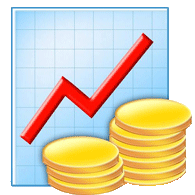What is CFD trading?
CFDs are considered to be a relatively new trading instrument that is gaining increasing popularity among traders and investors.
popularity among traders and investors.
If five years ago we could all find literally a couple of such assets in our MT4 trading terminal, now the range of different instruments is so large that some Forex brokers began to provide separate types of accounts for CFD trading, when you open which you will receive a full range of services when trading these data asset.
So what is CFD? A CFD is a special type of financial asset, which is a contract for the difference between the opening and closing prices of a transaction.
In generally understandable language, when trading CFDs, you and I enter into a kind of contract between each other or a broker, upon the closure of which we receive the difference in price between the opening and closing of the transaction in the form of profit or loss, depending on where the price of the asset goes.
Thanks to the introduction of this tool, all traders can try to trade stocks without having them in their hands, and you can open a position for both buying and selling.
Trading CFDs is no different from trading the currency we are all familiar with, and the only difference between them is the specification of the contract.
CFD or Shares
Many beginners are interested in what is the difference between trading CFDs on stocks and actually trading the stocks themselves. The fact is that to trade real shares on the stock exchange, you need to own a capital of several tens of thousands of dollars, and if you buy shares, the exchange charges you a commission for adding you to the list of shareholders.
This takes not only money, but also time, due to which you cannot make money on exchange rate differences here and now. Also, in order to make money on exchange rate differences, you need to own an asset, so on the stock exchange, unlike CFD trading, you cannot sell what you do not have.
When working with contracts for difference, you trade as if with air or whatever you understand as nothing, so there is no time delay and there is no commission. A CFD is a derivative asset that is calculated on the basis of an underlying asset, namely a real stock, index or commodity.
Thus, thanks to its peculiarity, almost every trader who has at least one hundred dollars in his account has the opportunity to trade CFDs on shares and make money on changes in their value. You also have the opportunity to use leverage of 1 to 100, which not a single broker on the stock exchange will provide you with.
Thanks to high leverage and the ability to open positions in any direction, a trader who works with CFDs on shares has more opportunities to earn money than a player on the stock exchange.
CFD and Dividends
There is a myth on Forex sites that when trading CFDs on shares, if you are in a buy position on the day of dividend distribution, then you will be credited with your interest. Unfortunately, this is nothing more than a myth, because if this were reality, then many would buy CFDs per share specifically before the distribution of dividends, and with the huge leverage provided by the broker, one could earn impressive sums.
In fact, we do not own the underlying asset, namely the share, which means that we have neither voting rights at meetings nor dividends as such
CFD and Hedging
The CFD instrument for shares is primarily of interest to investors and various hedge funds. You will ask why? Let's consider a typical situation where you, as an investor, bought shares in order to preserve your funds and profit from dividends. However, a situation has developed in the market that all your purchased shares begin to fall in price.
It is at this point that a CFD can help preserve your capital, since you can open a CFD transaction on shares for sale in the same volume as the purchased shares and, using the profits received, compensate for losses due to falling prices in your investment portfolio .
To summarize, we can safely say that CFD is nothing more than a unique find of brokers, thanks to which traders can experience all the delights of trading stocks, futures, and indices without having the huge capital that is necessary to trade the underlying instrument.
Remember that CFD is a highly liquid instrument, so when using high leverage, you can either earn a large sum or lose it.
